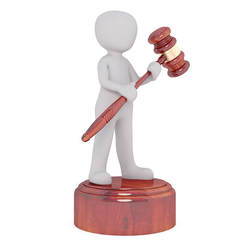 What happens in a psychotherapist's office is a mystery to most people, and even those who attend sessions are usually unaware of other people's issues. So I thought I'd break the taboo, and let the reader in on a secret, the answer to the question: "what fear comes up the most often?" I'd say that claustrophobia, for example, is quite common. As is a linked fear of public transportation, particularly the subway and buses. Going beyond the boundaries of a known environment is another. But the largest group that I come across by far is the fear of other people, and within that category, the fear of being judged. On the surface of things, we can look at that statement, and be somewhat bemused. Why on earth would we so fear judgement? Does it really matter if other people look at us from under raised eyebrows, or act superior when we say something out of synch? Then again, judgement is what we also seem to fear the most in death. We propose an almighty being who's going to judge us after we pass, and dole out unimaginable punishment to those he (or she) finds lacking, according to strict criteria. The punishment specifically involves being cast out from a place of love, into tortuous hell. One of the problems with social anxiety is that we make our own fears come true, as if they were a prophecy. We fear being judged and cast out, become very self-conscious, and retreat in order to control our anxiety. We've taken ourselves out of the context, when we want to be in it. We've lost our relationship with what we most desire. The importance of being in relation is present from birth. We want to attach, we want to relate, we want to find love and other people. The danger and consequences of an infant not gaining those secure relationships forms the core of object relations and attachment theory. But the dangers of being judged are written deeper still, into thousands of years of history. In our lineages of human experience, there is perhaps no greater danger than being judged, because to be judged is usually to be viewed partially. It is akin to being objectified and reduced. It is therefore, a precondition to the worst of human violence, and a precondition to being scapegoated and othered. Slavery, genocide, tribalism and the dangers faced by infants and children all have the same danger in common: that they might be judged to be a thing, an idea, a single word. Once this happens, we're reduced and vulnerable. To be cast out of parental love as a child, or a tribe of any kind, is a dangerous thing. We know it down to our bones, particularly if we've been raised in an environment in which that danger has already burned us. As children, we know when we've been treated as "just" a nuisance, "nothing but" a pest, as stupid, an object, or lesser than a sibling. It hurts and damages our sense of identity. We become wary, anxious, and watchful. Psychotherapy is a relationship that's highly attuned to help you navigate your emotional world. To let you in on another secret: therapists like me are fortunate to be able to be there when people begin to find the inner resources to tackle their social anxiety. It's quite something to see courage emerge to secure its own gradual reward. People will always judge, but when we're able to be present by virtue of our choice, we have wrested our will to relate from the cold talons of our fear.
0 Comments
|
Tom BarwellPsychotherapist, working in private practice online Archives
February 2024
Categories
All
|
 RSS Feed
RSS Feed